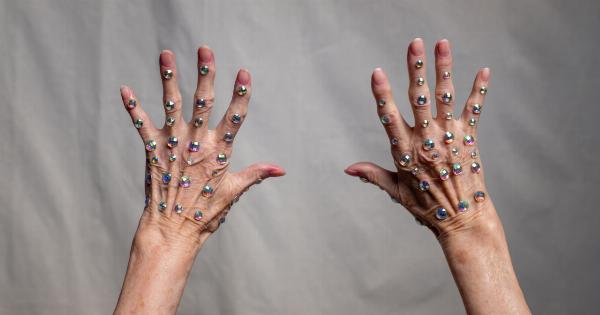Menopause is a challenging phase in every woman’s life that signals the end of the menstrual cycle. It’s the time when the body undergoes hormonal changes that could result in various skin issues.
The sudden change in hormones often causes a dramatic impact on the skin, such as hydration and firmness loss, increased dryness, and reduced elasticity, resulting in a dull complexion.
The good news is there are ways to maintain a shimmering complexion after menopause. In this article, we will discuss some effective tips and tricks to help women achieve glowing and healthy-looking skin.
1. Moisturize Your Skin Daily
The first rule of skincare is always to keep your skin hydrated. After menopause, the decrease in hormone levels results in significant changes in the skin’s ability to retain moisture. Hence, to achieve radiant skin, moisturizing is crucial.
Invest in a fragrance-free, lightweight moisturizer or hydrating facial oil to keep your skin moisturized. Applying a moisturizer after a shower also helps to lock in moisture and leave your skin soft and supple all day long.
2. Try Facial Massage
Facial massage is an effective technique to reduce wrinkles, relax facial muscles, and boost circulation. Research proves that incorporating facial massage into your daily skincare routine can improve your skin’s appearance.
Massage stimulates blood flow, leading to a brighter complexion, an even tone, and reduced puffiness. Use your fingers to massage your face, gently applying pressure. This self-massage ritual can help improve your mood and relieve stress while achieving a healthy glow for your skin.
3. Use Sunscreen Daily
The sun’s UV rays are one of the leading causes of skin aging, and they can be even more damaging after menopause. Make it a habit to apply sunscreen daily to prevent premature aging and skin damage.
Exposure to sunlight without any protection can cause age spots, fine lines, and wrinkles. Always apply a sunscreen of SPF 30 or higher and reapply every two hours if you are outside for extended periods. You can also use sun hats and sunglasses to protect your face and eyes.
4. Eat a Healthy Diet
Your skin reflects what you eat. A healthy diet rich in fruits, vegetables, healthy fats, and lean proteins can make a significant impact on your skin.
These foods are high in vitamins and minerals that help to promote cell regeneration, collagen production, and hydration. Fish, nuts, and seeds are high in omega-3 fatty acids, which reduces oxidative stress and inflammation, leading to improved skin texture and elasticity. Therefore make sure to incorporate a healthy diet for glowing and radiant skin.
5. Get Adequate Sleep
Sleep is like a fountain of youth for your skin. It’s essential to get adequate sleep to rejuvenate the skin. Your skin repairs itself while you’re sleeping, which means that insufficient sleep may result in skin aging.
Sleeping on your back can also help prevent wrinkles as wrinkles tend to form where the skin folds. Aim to get at least eight hours of sleep every night for a healthier-looking skin.
6. Exercise Regularly
Regular exercise is good for both physical and mental health and can also improve your skin. Exercise increases blood circulation, resulting in radiant and healthy-looking skin.
It may also help regulate hormone levels after menopause, leading to better skin. Aim to get at least 30 minutes of moderate exercise per day and see the difference it makes to your body and mind.
7. Use Products Rich in Retinol and Hyaluronic Acid
Products that contain retinol and hyaluronic acid have proven benefits for your skin. Retinol is derived from Vitamin A and helps to stimulate collagen production, reduce fine lines and wrinkles, and improve skin texture and tone.
Hyaluronic acid, on the other hand, is a powerful humectant that helps to hold onto moisture, resulting in plumper and smoother skin. Look out for these ingredients while buying skincare products and commit to using them regularly to obtain a glowing complexion.
8. Be Gentle with Your Skin
Being gentle with your skin is critical to achieve and maintain a shimmering complexion. Avoid using harsh soaps or cleansers as they can strip your skin of natural oils, leading to dryness and irritation.
Make sure to use gentle cleansers, preferably fragrance-free, and avoid over-cleansing the skin. Over-exfoliating the skin can also cause irritation and dryness, leading to a dull complexion. Hence exfoliate at a minimum of once a week or according to your skin’s needs.
9. Stay Hydrated
Staying hydrated is essential for overall health and vital for healthy-looking skin. Drinking enough water helps to flush out toxins from the body and improve skin elasticity and moisture content.
Make it a habit to drink at least eight glasses of water daily, and you’ll soon notice the difference it makes in the appearance and texture of your skin.
10. See a Dermatologist
If you are experiencing skin issues that do not improve with home remedies, consider consulting a dermatologist. They can prescribe tailored treatments to address your specific skin problems and help you achieve your desired skin goals.
They may also recommend procedures such as chemical peels or microdermabrasion to renew the skin.
The Takeaway
It’s normal to experience skin changes after menopause, but by incorporating these tips and tricks, you can achieve a shimmering complexion.
Remember to moisturize your skin daily, practice facial massage, use sunscreen, eat a healthy diet, get enough sleep, exercise regularly, use products rich in retinol and hyaluronic acid, be gentle with your skin, stay hydrated and always consult a dermatologist if you need more specific advice.





























